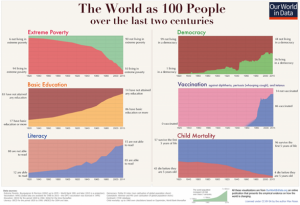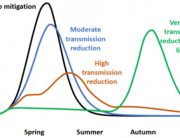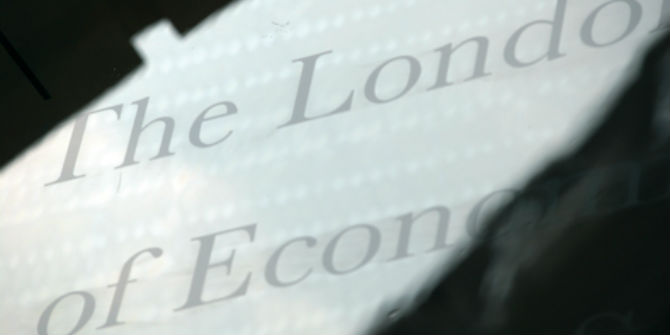Moral Progress used to be one of the core ideas and commitments of the Enlightenment. Then it became a controversial idea, but a new theory of moral progress is now gaining traction, argues LSE Philosophy PhD student Rafael Ruiz de Lira.
Where Did Progress Go?
Moral progress was central to the Enlightenment project. Philosophers like Kant, Hegel, Marx, and Comte put forward deterministic models with “iron laws” of historical improvement, suggesting that social advances were driven by inexorable forces such as God, economics, or technology. And, while there is no denying the influence and importance of material factors in driving history, theories that posited strong historical determinism denied the agency of billions of people.
Furthermore, these theories were appropriated by defenders of colonialism and imperialism, where some countries attempted to use their idea of progress for an agenda of “civilizing the barbarians”. And, just a few years later, the world had to endure the regressive episodes of the Two World Wars. Both of these movements were strongly fueled by ideological factors, such as nationalism. The optimism of a straight arrow of social and moral progress was denied.
Despite the controversial history of the concept of progress as naive, simplistic, or politically problematic, the idea of progress continues to be the basis of political progressivism and the political left. Yet many people have abandoned belief in moral progress, and might feel hopeless as a result. Without a belief in various forms of progress, the idea that the society of tomorrow can be better than the one today, we can easily slip into political cynicism or apathy. In fact, the whole project of moral and political philosophy collapses if we don’t believe in improvement anymore. Criticizing today’s society would be useless if we didn’t think we could do better tomorrow. So we should make an attempt to rehabilitate the idea of progress without adopting its controversial historical baggage.
Skepticism about Progress, and Why It’s Wrong.
Due to these historical factors, many today might deny that progress is occurring. The majority of people believe that the world is either deteriorating or stagnating. According to a recent survey, only 4% of people in the UK believe the world is getting better.[1] Yet I believe that the pessimists are demonstrably wrong, and that their pessimism sometimes fuels the search for populist or charismatic leaders that will “shake things up” to get us out of the situation. [2]
To show why this pessimism is wrong, let me differentiate between two types of progress: Social Progress, which encompasses improvements in well-being and quality of life, and Moral Progress, which relates to advancements in ethical beliefs, intentions, and behaviors. Contrary to popular belief, both types of progress are actually occurring.
The best way to see that Social Progress is occurring is to check into straightforward economic indicators, which show how standards of living have skyrocketed since the Industrial Revolution. Perhaps the best summaries that offer a less cynical view of the world, come from a movement that has been recently called “New Optimism”, led by Steven Pinker in The Better Angels of Our Nature and Enlightenment Now, Hans Rosling in Factfulness, as well as the websites Our World in Data and Gapminder.

Max Roser (2016) – “The short history of global living conditions and why it matters that we know it” Published online at OurWorldInData.org. Retrieved from: ‘https://ourworldindata.org/a-history-of-global-living-conditions’ [Online Resource]
The pervasive skepticism about progress might stem from a focus on negative news that we see on TV or social media, combined with cognitive biases that make us remember dramatic events more vividly than gradual improvements (i.e. the identifiable victim effect, and scope insensitivity). However, the data overwhelmingly supports a narrative of significant and ongoing progress. Although some important caveats worth keeping in mind are: the ongoing climate crisis and environmental degradation, the rise in the number of animals being factory farmed, and the rise of potential technology to manufacture weapons that could cause mass destruction, such as nuclear weapons, engineered pandemics, and malicious Artificial Intelligence, to name a few.
Let’s now evaluate Moral Progress. The clearest statement of moral progress is to evaluate what Peter Singer calls The Expanding Circle, or what Buchanan and Powell have called the inclusivist anomaly. They point out that we can overcome our tendencies for tribalism, nepotism, and egoism, and that we are living in a new historical trend of granting rights to a broader scope of moral patients, that has also been taking place since the Industrial Revolution. This is the trend of individual and human rights, of the abolition of slavery, of democracy, of women’s suffrage, and of LGBTQ+ rights. All plausible moral and political views should see these as moral advancements. [5]
It is worth keeping in mind that to believe in moral progress doesn’t mean to believe in a straight line of constant progress in a permanent upward trajectory. There are clear episodes of moral and political regression, important returns to political nepotism and tribalism, where we don’t see outgroups as worthy of moral engagement. These situations particularly arise when material conditions deteriorate, or when we perceive external groups as threats to our own lives or quality of life. When the world is perceived as a zero-sum game–as a competition for resources that only a few can benefit from–there are great instances of moral backsliding, contraction of the moral circle, and dehumanization.[6]
Have We Run Out of Moral Progress?
One concern might be that theories of moral progress are simply retrospective, highlighting what now seems obvious in the liberal Western world nowadays, like seeing the abolition of slavery and granting universal democratic rights as morally good. A skeptic might say that maybe we have run out or are running out of moral progress, that we can only make very minimal adjustments to our moral and political systems, but that we can’t make substantial moral improvements anymore.
The current philosophical literature on this topic also seems backward-looking, capturing paradigmatic cases of past progress that receive assent across the moral and political spectrum, like the abolition of slavery or universal suffrage. They want to prove that there has been historical moral progress, and we do so by pointing out moral changes that we now take as common sense moral improvements. However, the research in this area is not making decisive substantial contributions regarding how to find or achieve future progressive scenarios.
I believe that we haven’t run out of progress, and that most cases of moral progress are in fact still in the future. People are now starting to hold cosmopolitan views that show concern for people all across the globe. We are also concerned with animal rights and welfare, and with the wellbeing of future generations. These are trending topics in moral philosophy, and a continuation of this trend of the expanding circle of moral concern.
So, while I can’t give a full-blown theory of progress here, I can at least provide a sketch of one important idea that I believe should be included in any of our theories of moral progress. Let’s say we are in the position of a policymaker, such as a government, legislator, or some figure able to shape public policy or important decisions. This policymaker should want to act in moral ways. Yet, if a policymaker were to ask the ethicist community, or consult the moral philosophy literature, they would probably end up more confused than enlightened. There is a lot of moral disagreement, and we don’t know what the moral truth or the better moral view actually is.
What I can offer here is a heuristic principle that allows us to enact policy changes that are more often morally progressive than morally regressive. In particular, we would want to avoid committing moral atrocities similar to slavery, dictatorships, or climate change. One of the most important contributions of a theory of progress could be guidelines to prevent these moral atrocities, that is, situations where there is a great deal of moral badness according to some or many plausible ethical theories. In this sense, I believe some formulations of precautionary principles can help us avoid committing such moral atrocities.
My concrete idea is the following: if many well-supported or plausible moral theories within normative ethics (some examples include some plausible formulations of deontology, contractualism, consequentialism, or virtue ethics) say that we are committing a moral atrocity, we should urgently attempt to cease that behavior. Historically, this has been the case with the oppression of slaves, with racism, sexism, and homophobia. These actions were nearly universally condemned by the most plausible formulations of these moral theories.
We think slavery and dictatorship are deeply morally wrong, and we are quite confident of these judgments. This confidence is because a variety of plausible moral theories all condemn them. These acts are morally overdetermined. Even if someone convincingly refuted all formulations of utilitarianism or kantianism, we would still believe slavery or dictatorship are wrong, because of plausible contractualist, or virtue ethics reasons.
Similarly, if multiple moral theories say there’s a great moral benefit that we could obtain at low cost, we should aim to do that action or enact that policy. We should aim to pick up “ethical low-hanging fruit”. When faced with potential moral atrocities, a theory of progress can offer a meta-theoretical principle to guide us err on the side of caution and prevent committing actions with dangerous moral repercussions, even if ordinary first-order moral theories are not unanimous on the issue at hand.
Of course, since I’m putting forward a heuristic, we should be aware that heuristics can sometimes fail. Perhaps following the action mandated by utilitarianism, or by kantianism, would yield greater moral progress than following my heuristic in some specific situations. But hopefully, the idea of looking for moral consensus or overlap can have a substantially good ratio of ethical successes over ethical failures.
Precautionary Principles Need Not Be Conservative.
It would be great, when studying moral progress, to succeed in going beyond the current status quo of merely reiterating the social and political ideas of our time. Let me now outline how this precautionary principle might not be just accepting the current status quo, but going beyond it in important ways.
I have said that we should avoid creating great moral badness that violates plausible moral theories. One way to locate moral atrocities is to focus on acts that are committing a great moral badness according to multiple plausible ethical theories, and particularly those that we are performing for relatively minor egoistic gains. Let me provide three quick examples of how this could work, by spelling out cases that seem to be directions towards moral progress:
- A seemingly straightforward extension of such a precautionary principle means that we should cease creating further animal suffering. Practices such as factory farming create immense suffering, and deny animal freedom or agency in extreme ways, so it is a stance supported by many ethical frameworks. This means we should stop factory farming, using animals for clothes, or animal experimentation for cosmetics, and other forms of animal exploitation for minor gains, such as for their taste or for creating slightly fancier clothes.
- Another plausible case where this principle could be applied is the moral arbitrariness of the circumstances where a person is born. Many plausible ethical theories say that your place of birth is a morally arbitrary and irrelevant factor, yet the country where you are born heavily determines your life, including your wellbeing and your access to opportunities in a morally unjustifiable way. Furthermore, sacrificing a luxury is a minor gain not as great as the benefit obtained by someone in dire need, as outlined by people like Singer (1972) and MacAskill (2015), so it would be comparatively minor costs for major benefits.[7] We should aim to remedy such injustices, which might justify efforts for global wealth redistribution, or much more open borders.
- The ethical consideration of future generations is also a rapidly developing field, arguing that the temporal circumstances of one’s birth might also be also morally irrelevant. Without having to commit to an extreme version of this view, a variety of moral theories defend placing at least some degree of concern in making sure that future people are able to lead good lives. A minimal view demands that current policies do not disproportionately benefit present populations at the great expense of future ones, promoting climate sustainability and the long-term welfare of humanity.
These are some of my predictions as to where the future of ethics is heading and should head. A theory of progress can help guide the future of ethics by locating this “low-hanging ethical fruit” of intertheoretical moral consensus, which has a greater probability of being morally good, as well as defended by future generations of people and moral philosophers than views that only rely on a particular or fringe moral view. The examples above—ending factory farming, addressing global inequality, and ensuring the welfare of future generations—are areas where multiple ethical theories converge to suggest points where significant moral improvements can be made at relatively low cost.
The principle can be applied to other novel cases. The policymaker should ask themselves something like the following: “Is doing this act, or allowing this situation to continue, judged to be deeply morally wrong by any plausible moral theory (such as variants of deontology, consequentialism, virtue ethics, or contractualism)?” If it is, it should at least give us pause before enacting such an action. And if the action is universally or nearly universally condemned by various moral theories, there is a significant risk that we are committing a moral atrocity.
To conclude, where should we go from here? I believe that ethicists will play a pivotal role in looking for points of intertheoretical consensus and translating them into practical policy proposals. Citizens can also get informed by this ethical consensus to make better choices regarding which products to buy, as well as which charities, political parties, and political movements to support. Finally, governments and policymakers have the responsibility to avert policy decisions that perpetuate moral harms that infringe upon well-established and overdetermined ethical principles.
If moral progress is a real thing, as I’ve argued here, then the thought “how would future generations view us?” can be a useful guideline for improving moral behavior. When trying to act morally, we should try to find ethical consensus, and when in doubt, err on the side of being kind, rather than cruel, mocking, or ambivalent. Over many generations, this would have a compounding effect that would radically transform our societies.
By Rafael Ruiz de Lira
Rafael Ruiz de Lira is a PhD Candidate at the Department of Philosophy, Logic, and Scientific Method. He currently researches moral and social progress from an interdisciplinary perspective.
Notes
[1] YouGov, 2020. “Generally speaking, do you think the world is becoming a better or worse place, or is it staying much the same?”
[2] Buchanan, A. (2020). Our Moral Fate: Evolution and the Escape from Tribalism. Cambridge, MA: MIT Press.
[3] Storr, V. & Choi, G. (2019). Do Markets Corrupt Our Morals?. Springer Verlag, p. 6.
[4] See e.g. A Global History of Living Conditions at Our World in Data.
[5] Singer 1981 [2011]; Buchanan and Powell 2018. The Expanding Circle: Ethics, Evolution, and Moral Progress. Princeton University Press.; Buchanan, A., & Powell, R. (2018). The Evolution of Moral Progress: A Biocultural Theory. Oxford University Press.
[6] Buchanan and Powell 2018; Sauer 2019; Buchanan 2020. The Evolution of Moral Progress: A Biocultural Theory. Oxford University Press; Sauer, H. (2019). “Butchering Benevolence. Moral Progress beyond the Expanding Circle.” Ethical Theory and Moral Practice, 22, 153–167; Buchanan, A. (2020). Our Moral Fate: Evolution and the Escape from Tribalism. Cambridge, MA: MIT Press.
[7] Singer, in his famous thought experiment about the drowning child, developed the influential ethical principle “if it is in our power to prevent something bad from happening, without thereby sacrificing anything of comparable moral importance, we ought, morally, to do it”. (Singer, P. (1972) “Famine, Affluence, and Morality.” Philosophy & Public Affairs, Vol. 1, No. 3, p. 231.)
Influenced by Singer, MacAskill has further developed this idea into the x100 multiplier of effective charitable donations, arguing that the global poor can benefit x100 times more for the same amount of money. That would mean that spending £100 on yourself is more closely comparable to benefitting somebody £10.000 abroad in terms of welfare, given that it could provide them with a roof, food for a substantial amount of time, or important life-saving medicine. (MacAskill 2015, pp. 22-23) Taken together, the two arguments might present a compelling argument for wealth redistribution, since we would be able to benefit the global poor substantially at relatively minor cost to ourselves.


























































































































Connect with us
Facebook
Twitter
Youtube
Flickr